Romans N. T. Wright Lesson 2
Chris Knepp
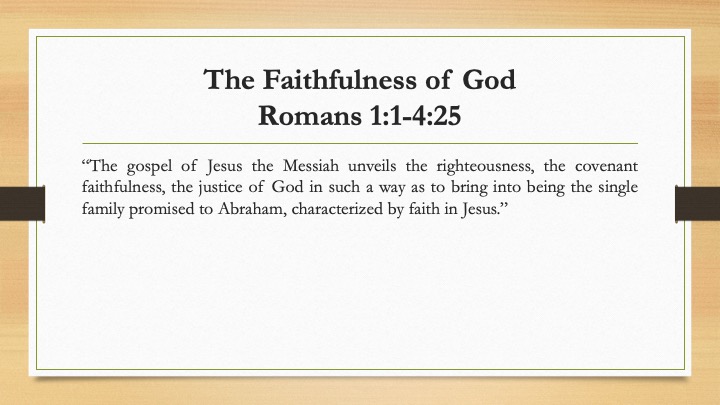
The Faithfulness of God
Romans 1:1-4:25
“The gospel of Jesus the Messiah unveils the righteousness, the covenant faithfulness, the justice of God in such a way as to bring into being the single family promised to Abraham, characterized by faith in Jesus.”
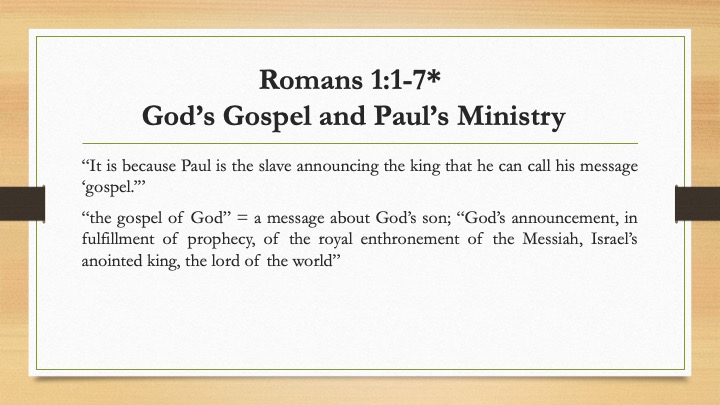
Romans 1:1-7*
God’s
Gospel
and Paul’s Ministry
“It is because Paul is the slave announcing the king that he can call his message ‘gospel.’”
“the gospel of God” = a message about God’s son; “God’s announcement, in fulfillment of prophecy, of the royal enthronement of the Messiah, Israel’s anointed king, the lord of the world”
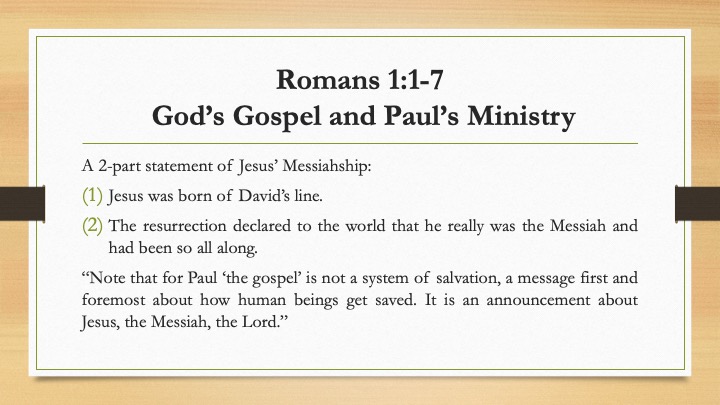
Romans 1:1-7
God’s
Gospel
and Paul’s Ministry
A 2-part statement of Jesus’ Messiahship:
(1)Jesus was born of David’s line.
(2)The resurrection declared to the world that he really was the Messiah and had been so all along.
“Note that for Paul ‘the gospel’ is not a system of salvation, a message first and foremost about how human beings get saved. It is an announcement about Jesus, the Messiah, the Lord.”
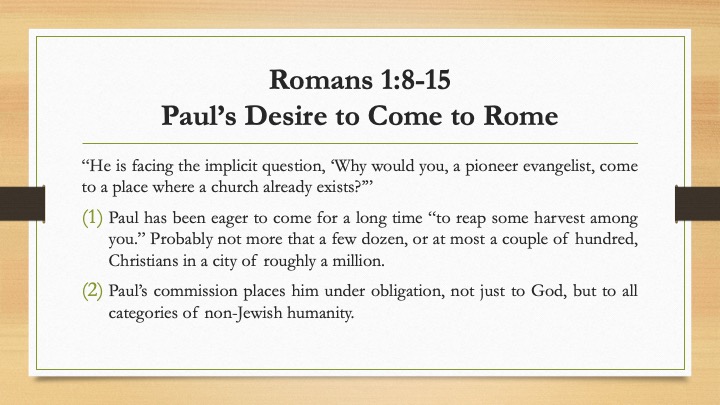
Romans 1:8-15
Paul’s Desire to Come to Rome
“He is facing the implicit question, ‘Why would you, a pioneer evangelist, come to a place where a church already exists?’”
(1) Paul has been eager to come for a long time “to reap some harvest among you.” Probably not more that a few dozen, or at most a couple of hundred, Christians in a city of roughly a million.
(2) Paul’s commission places him under obligation, not just to God, but to all categories of non-Jewish humanity.
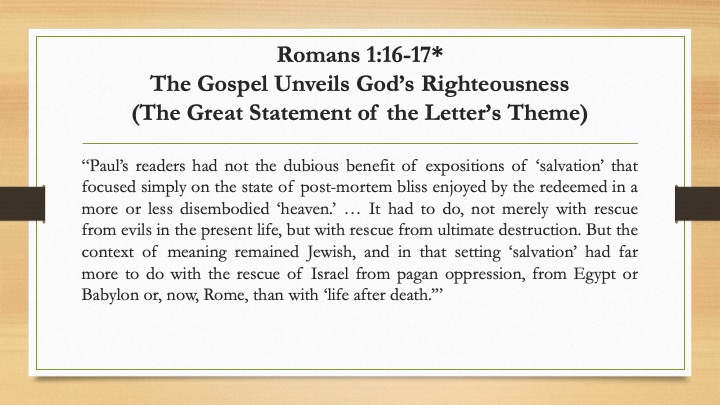
Romans 1:16-17*
The Gospel Unveils God’s Righteousness
(The Great Statement of the Letter’s Theme)
“Paul’s readers had not the dubious benefit of expositions of ‘salvation’ that focused simply on the state of post-mortem bliss enjoyed by the redeemed in a more or less disembodied ‘heaven.’ … It had to do, not merely with rescue from evils in the present life, but with rescue from ultimate destruction. But the context of meaning remained Jewish, and in that setting ‘salvation’ had far more to do with the rescue of Israel from pagan oppression, from Egypt or Babylon or, now, Rome, than with ‘life after death.’”
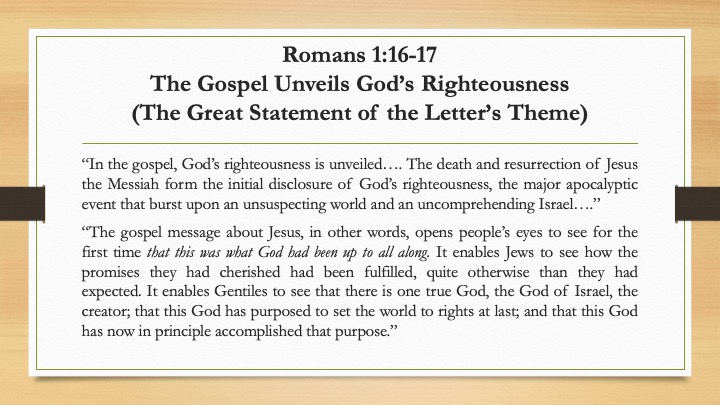
Romans 1:16-17
The Gospel Unveils God’s Righteousness
(The Great Statement of the Letter’s Theme)
“In the gospel, God’s righteousness is unveiled…. The death and resurrection of Jesus the Messiah form the initial disclosure of God’s righteousness, the major apocalyptic event that burst upon an unsuspecting world and an uncomprehending Israel….”
“The gospel message about Jesus, in other words, opens people’s eyes to see for the first time that this was what God had been up to all along. It enables Jews to see how the promises they had cherished had been fulfilled, quite otherwise than they had expected. It enables Gentiles to see that there is one true God, the God of Israel, the creator; that this God has purposed to set the world to rights at last; and that this God has now in principle accomplished that purpose.”
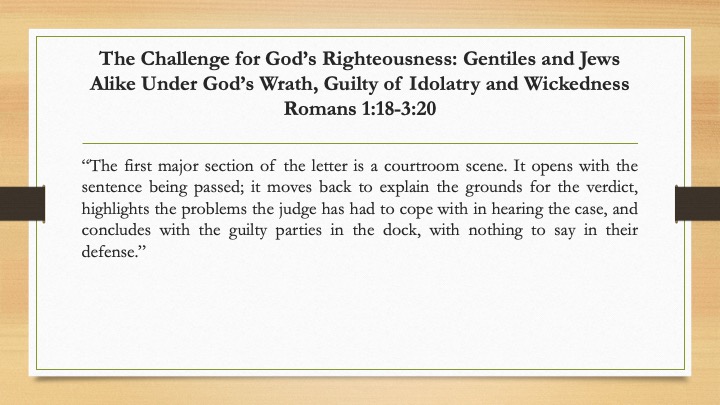
The
Challenge for God’s Righteousness: Gentiles and Jews Alike Under God’s Wrath,
Guilty of Idolatry and Wickedness
Romans 1:18-3:20
“The first major section of the letter is a courtroom scene. It opens with the sentence being passed; it moves back to explain the grounds for the verdict, highlights the problems the judge has had to cope with in hearing the case, and concludes with the guilty parties in the dock, with nothing to say in their defense.”
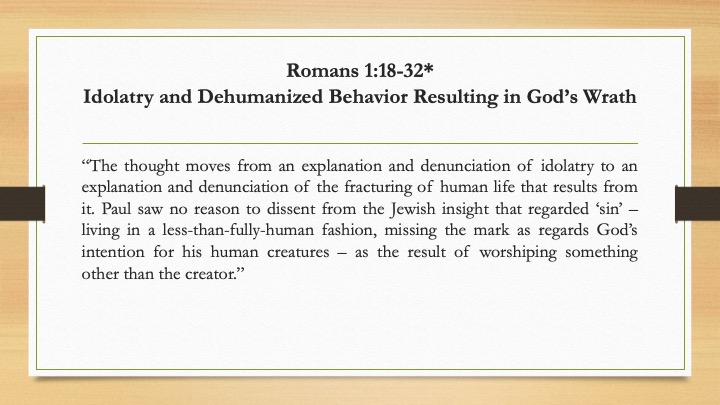
Romans 1:18-32*
Idolatry and Dehumanized Behavior Resulting in God’s Wrath
“The thought moves from an explanation and denunciation of idolatry to an explanation and denunciation of the fracturing of human life that results from it. Paul saw no reason to dissent from the Jewish insight that regarded ‘sin’ – living in a less-than-fully-human fashion, missing the mark as regards God’s intention for his human creatures – as the result of worshiping something other than the creator.”
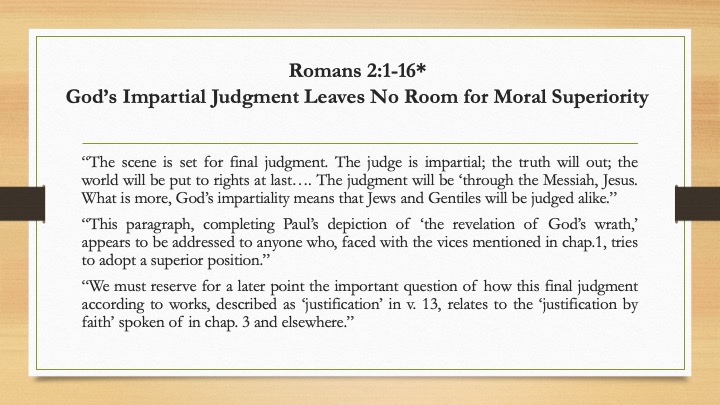
Romans 2:1-16*
God’s Impartial Judgment Leaves No Room for Moral Superiority
“The scene is set for final judgment. The judge is impartial; the truth will out; the world will be put to rights at last…. The judgment will be ‘through the Messiah, Jesus. What is more, God’s impartiality means that Jews and Gentiles will be judged alike.”
“This paragraph, completing Paul’s depiction of ‘the revelation of God’s wrath,’ appears to be addressed to anyone who, faced with the vices mentioned in chap.1, tries to adopt a superior position.”
“We must reserve for a later point the important question of how this final judgment according to works, described as ‘justification’ in v. 13, relates to the ‘justification by faith’ spoken of in chap. 3 and elsewhere.”
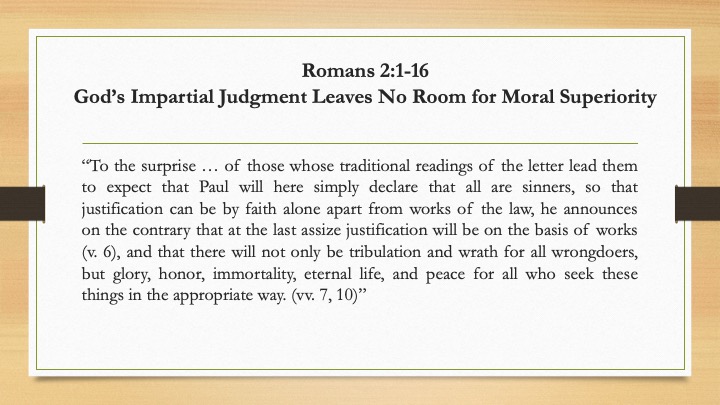
Romans 2:1-16
God’s Impartial Judgment Leaves No Room for Moral Superiority
“To the surprise … of those whose traditional readings of the letter lead them to expect that Paul will here simply declare that all are sinners, so that justification can be by faith alone apart from works of the law, he announces on the contrary that at the last assize justification will be on the basis of works (v. 6), and that there will not only be tribulation and wrath for all wrongdoers, but glory, honor, immortality, eternal life, and peace for all who seek these things in the appropriate way. (vv. 7, 10)”
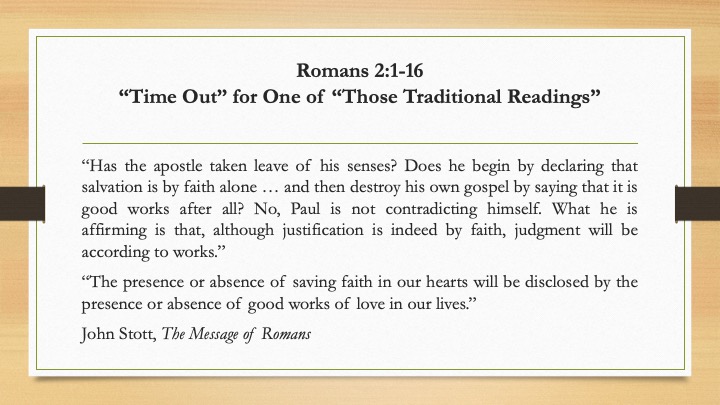
Romans 2:1-16
“Time Out” for One of “Those Traditional Readings”
“Has the apostle taken leave of his senses? Does he begin by declaring that salvation is by faith alone … and then destroy his own gospel by saying that it is good works after all? No, Paul is not contradicting himself. What he is affirming is that, although justification is indeed by faith, judgment will be according to works.”
“The presence or absence of saving faith in our hearts will be disclosed by the presence or absence of good works of love in our lives.”
John Stott, The Message of Romans
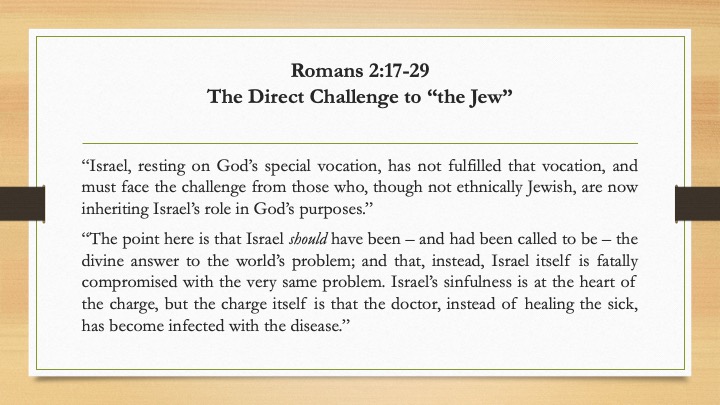
Romans 2:17-29
The Direct Challenge to “the Jew”
“Israel, resting on God’s special vocation, has not fulfilled that vocation, and must face the challenge from those who, though not ethnically Jewish, are now inheriting Israel’s role in God’s purposes.”
“The point here is that Israel should have been – and had been called to be – the divine answer to the world’s problem; and that, instead, Israel itself is fatally compromised with the very same problem. Israel’s sinfulness is at the heart of the charge, but the charge itself is that the doctor, instead of healing the sick, has become infected with the disease.”
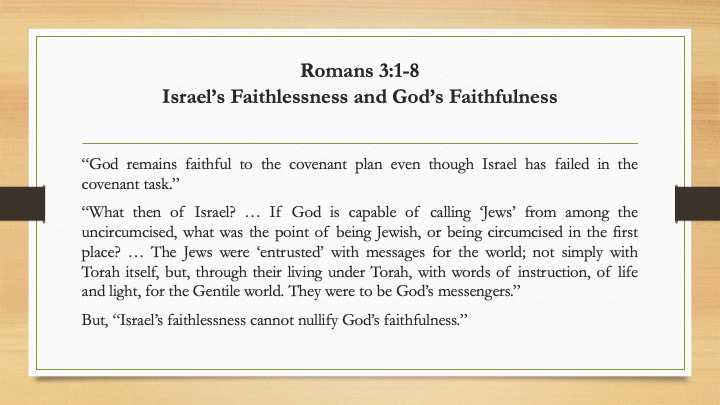
Romans 3:1-8
Israel’s Faithlessness and God’s Faithfulness
“God remains faithful to the covenant plan even though Israel has failed in the covenant task.”
“What then of Israel? … If God is capable of calling ‘Jews’ from among the uncircumcised, what was the point of being Jewish, or being circumcised in the first place? … The Jews were ‘entrusted’ with messages for the world; not simply with Torah itself, but, through their living under Torah, with words of instruction, of life and light, for the Gentile world. They were to be God’s messengers.”
But, “Israel’s faithlessness cannot nullify God’s faithfulness.”
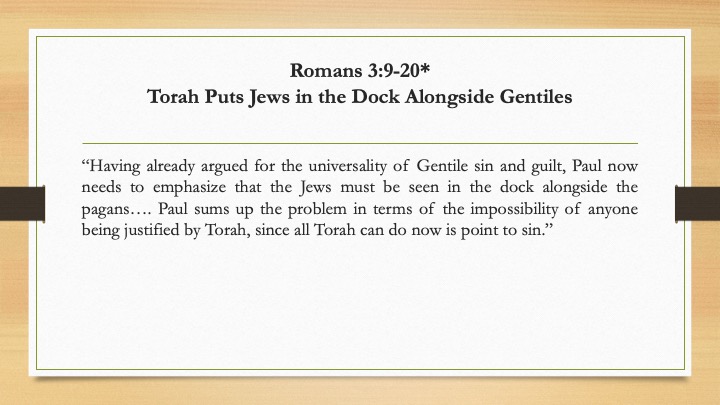
Romans 3:9-20*
Torah Puts Jews in the Dock Alongside Gentiles
“Having already argued for the universality of Gentile sin and guilt, Paul now needs to emphasize that the Jews must be seen in the dock alongside the pagans…. Paul sums up the problem in terms of the impossibility of anyone being justified by Torah, since all Torah can do now is point to sin.”
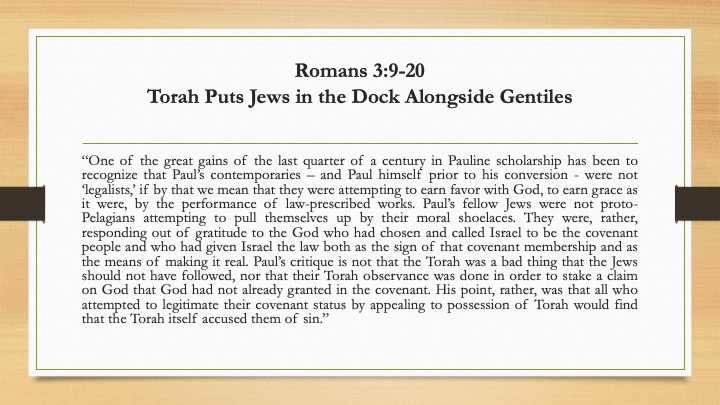
Romans 3:9-20
Torah Puts Jews in the Dock Alongside Gentiles
“One of the great gains of the last quarter of a century in Pauline scholarship has been to recognize that Paul’s contemporaries – and Paul himself prior to his conversion - were not ‘legalists,’ if by that we mean that they were attempting to earn favor with God, to earn grace as it were, by the performance of law-prescribed works. Paul’s fellow Jews were not proto-Pelagians attempting to pull themselves up by their moral shoelaces. They were, rather, responding out of gratitude to the God who had chosen and called Israel to be the covenant people and who had given Israel the law both as the sign of that covenant membership and as the means of making it real. Paul’s critique is not that the Torah was a bad thing that the Jews should not have followed, nor that their Torah observance was done in order to stake a claim on God that God had not already granted in the covenant. His point, rather, was that all who attempted to legitimate their covenant status by appealing to possession of Torah would find that the Torah itself accused them of sin.”
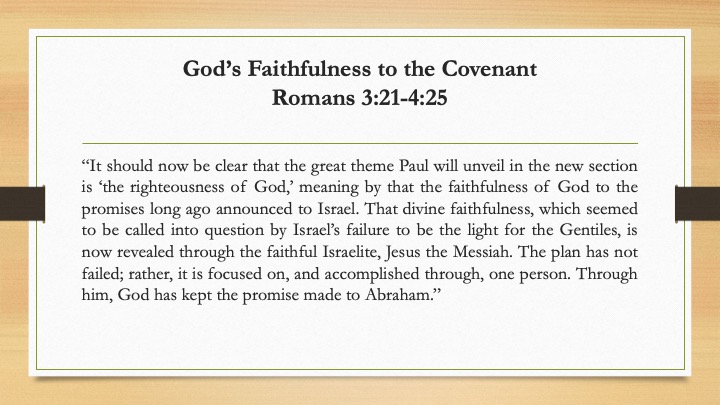
God’s Faithfulness to the Covenant
Romans 3:21-4:25
“It should now be clear that the great theme Paul will unveil in the new section is ‘the righteousness of God,’ meaning by that the faithfulness of God to the promises long ago announced to Israel. That divine faithfulness, which seemed to be called into question by Israel’s failure to be the light for the Gentiles, is now revealed through the faithful Israelite, Jesus the Messiah. The plan has not failed; rather, it is focused on, and accomplished through, one person. Through him, God has kept the promise made to Abraham.”
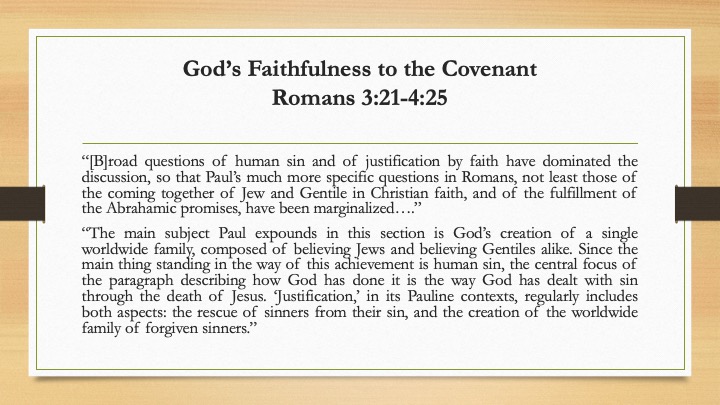
God’s Faithfulness to the Covenant
Romans 3:21-4:25
“[B]road questions of human sin and of justification by faith have dominated the discussion, so that Paul’s much more specific questions in Romans, not least those of the coming together of Jew and Gentile in Christian faith, and of the fulfillment of the Abrahamic promises, have been marginalized….”
“The main subject Paul expounds in this section is God’s creation of a single worldwide family, composed of believing Jews and believing Gentiles alike. Since the main thing standing in the way of this achievement is human sin, the central focus of the paragraph describing how God has done it is the way God has dealt with sin through the death of Jesus. ‘Justification,’ in its Pauline contexts, regularly includes both aspects: the rescue of sinners from their sin, and the creation of the worldwide family of forgiven sinners.”
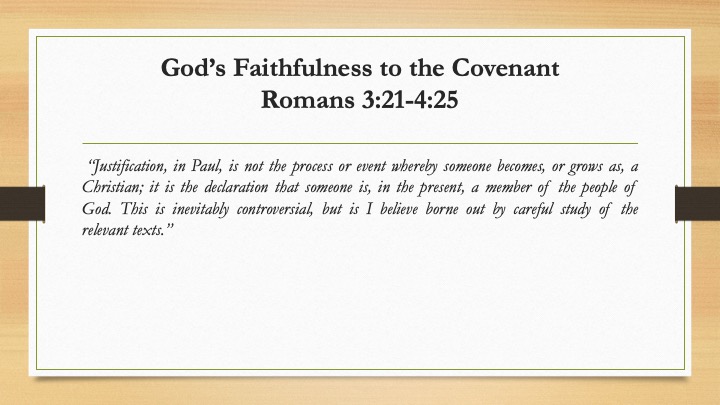
God’s Faithfulness to the Covenant
Romans 3:21-4:25
“Justification, in Paul, is not the process or event whereby someone becomes, or grows as, a Christian; it is the declaration that someone is, in the present, a member of the people of God. This is inevitably controversial, but is I believe borne out by careful study of the relevant texts.”
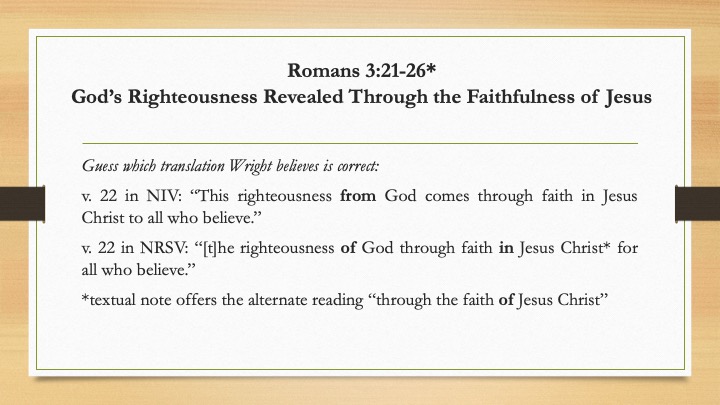
Romans 3:21-26*
God’s Righteousness Revealed Through the Faithfulness of Jesus
Guess which translation Wright believes is correct:
v. 22 in NIV: “This righteousness from God comes through faith in Jesus Christ to all who believe.”
v. 22 in NRSV: “[t]he righteousness of God through faith in Jesus Christ* for all who believe.”
*textual note offers the alternate reading “through the faith of Jesus Christ”
Note: Roman's 2:22 in Common English Bible:
22 "God’s righteousness comes through the faithfulness of Jesus Christ for all who have faith in him. There’s no distinction."
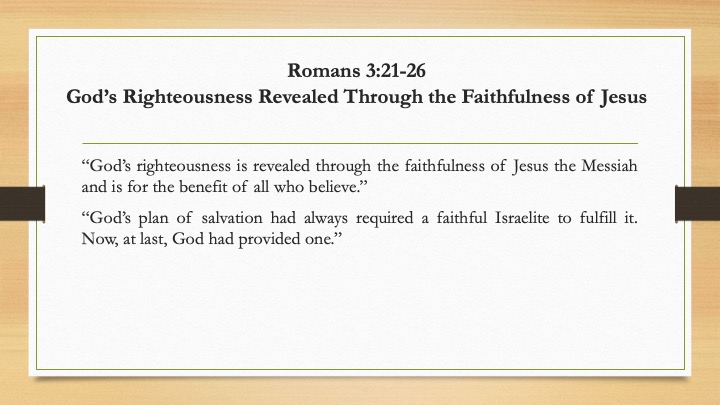
Romans 3:21-26
God’s Righteousness Revealed Through the Faithfulness of Jesus
“God’s righteousness is revealed through the faithfulness of Jesus the Messiah and is for the benefit of all who believe.”
“God’s plan of salvation had always required a faithful Israelite to fulfill it. Now, at last, God had provided one.”
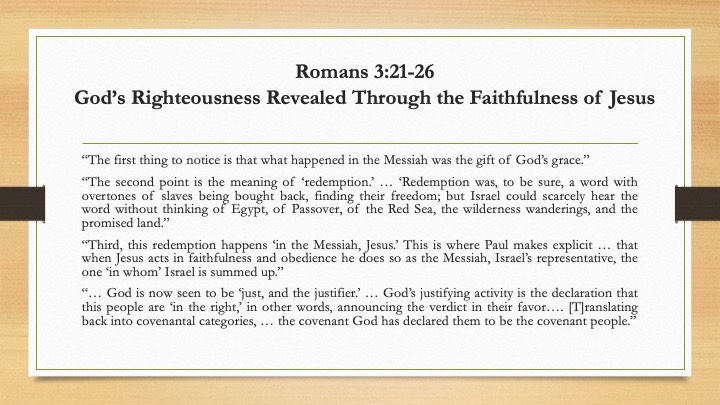
Romans 3:21-26
God’s Righteousness Revealed Through the Faithfulness of Jesus
“The first thing to notice is that what happened in the Messiah was the gift of God’s grace.”
“The second point is the meaning of ‘redemption.’ … ‘Redemption was, to be sure, a word with overtones of slaves being bought back, finding their freedom; but Israel could scarcely hear the word without thinking of Egypt, of Passover, of the Red Sea, the wilderness wanderings, and the promised land.”
“Third, this redemption happens ‘in the Messiah, Jesus.’ This is where Paul makes explicit … that when Jesus acts in faithfulness and obedience he does so as the Messiah, Israel’s representative, the one ‘in whom’ Israel is summed up.”
“… God is now seen to be ‘just, and the justifier.’ … God’s justifying activity is the declaration that this people are ‘in the right,’ in other words, announcing the verdict in their favor…. [T]ranslating back into covenantal categories, … the covenant God has declared them to be the covenant people.”
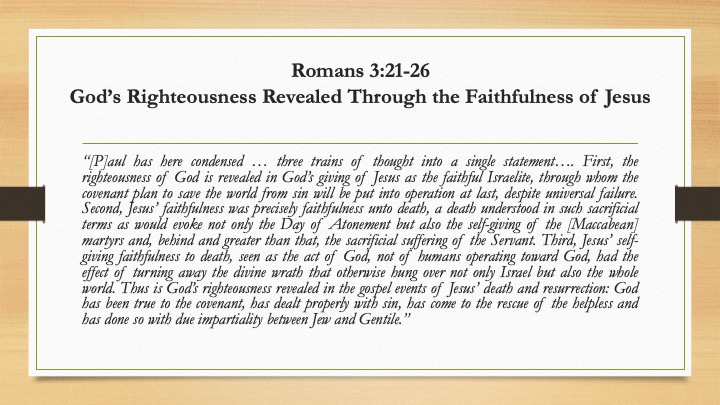
Romans 3:21-26
God’s Righteousness Revealed Through the Faithfulness of Jesus
“[P]aul has here condensed … three trains of thought into a single statement…. First, the righteousness of God is revealed in God’s giving of Jesus as the faithful Israelite, through whom the covenant plan to save the world from sin will be put into operation at last, despite universal failure. Second, Jesus’ faithfulness was precisely faithfulness unto death, a death understood in such sacrificial terms as would evoke not only the Day of Atonement but also the self-giving of the [Maccabean] martyrs and, behind and greater than that, the sacrificial suffering of the Servant. Third, Jesus’ self-giving faithfulness to death, seen as the act of God, not of humans operating toward God, had the effect of turning away the divine wrath that otherwise hung over not only Israel but also the whole world. Thus is God’s righteousness revealed in the gospel events of Jesus’ death and resurrection: God has been true to the covenant, has dealt properly with sin, has come to the rescue of the helpless and has done so with due impartiality between Jew and Gentile.”
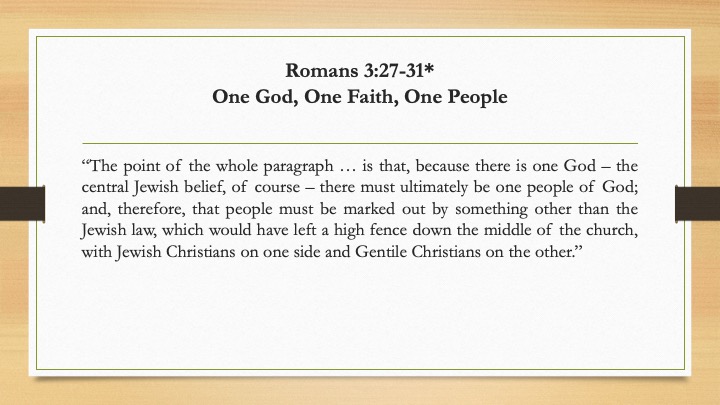
Romans 3:27-31*
One God, One Faith, One People
“The point of the whole paragraph … is that, because there is one God – the central Jewish belief, of course – there must ultimately be one people of God; and, therefore, that people must be marked out by something other than the Jewish law, which would have left a high fence down the middle of the church, with Jewish Christians on one side and Gentile Christians on the other.”
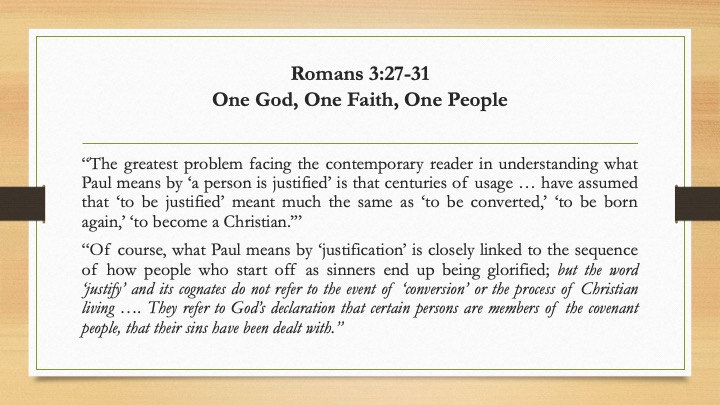
Romans 3:27-31
One God, One Faith, One People
“The greatest problem facing the contemporary reader in understanding what Paul means by ‘a person is justified’ is that centuries of usage … have assumed that ‘to be justified’ meant much the same as ‘to be converted,’ ‘to be born again,’ ‘to become a Christian.’”
“Of course, what Paul means by ‘justification’ is closely linked to the sequence of how people who start off as sinners end up being glorified; but the word ‘justify’ and its cognates do not refer to the event of ‘conversion’ or the process of Christian living …. They refer to God’s declaration that certain persons are members of the covenant people, that their sins have been dealt with.”
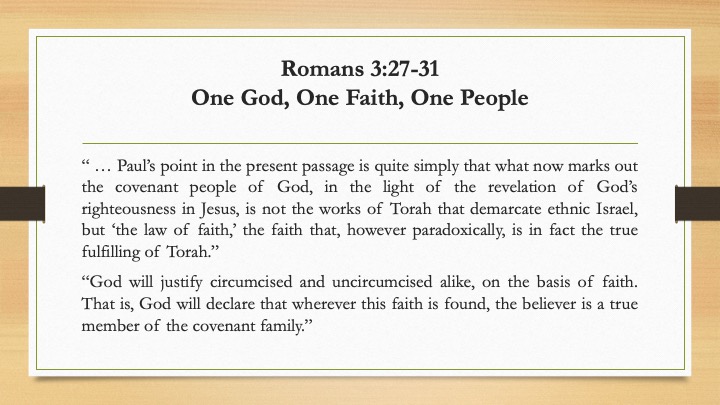
Romans 3:27-31
One God, One Faith, One People
“ … Paul’s point in the present passage is quite simply that what now marks out the covenant people of God, in the light of the revelation of God’s righteousness in Jesus, is not the works of Torah that demarcate ethnic Israel, but ‘the law of faith,’ the faith that, however paradoxically, is in fact the true fulfilling of Torah.”
“God will justify circumcised and uncircumcised alike, on the basis of faith. That is, God will declare that wherever this faith is found, the believer is a true member of the covenant family.”
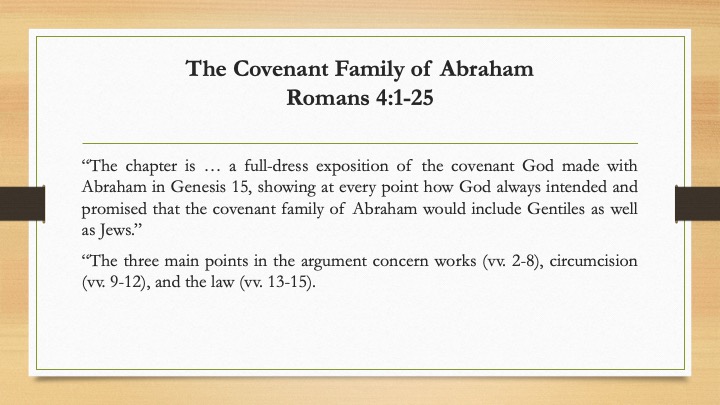
The Covenant Family of Abraham
Romans 4:1-25
“The chapter is … a full-dress exposition of the covenant God made with Abraham in Genesis 15, showing at every point how God always intended and promised that the covenant family of Abraham would include Gentiles as well as Jews.”
“The three main points in the argument concern works (vv. 2-8), circumcision (vv. 9-12), and the law (vv. 13-15).
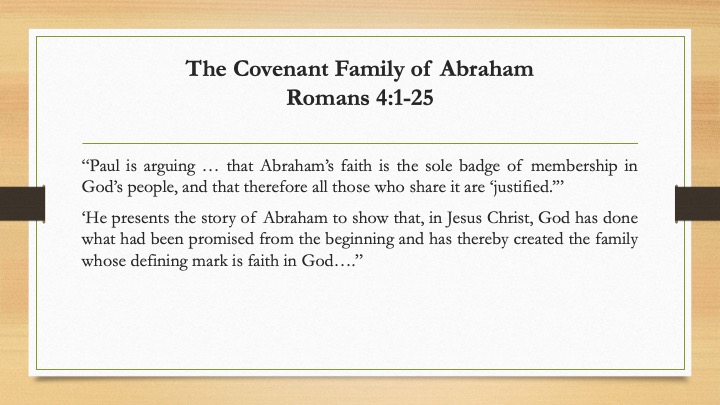
The Covenant Family of Abraham
Romans 4:1-25
“Paul is arguing … that Abraham’s faith is the sole badge of membership in God’s people, and that therefore all those who share it are ‘justified.’”
‘He presents the story of Abraham to show that, in Jesus Christ, God has done what had been promised from the beginning and has thereby created the family whose defining mark is faith in God….”